A degree in theology can open the door to many opportunities and allow you to live out your passion for helping others and delving into the mysteries of spiritual knowledge. Theology careers encompass a broad field that includes divinity, biblical studies, religious studies, and ministry.
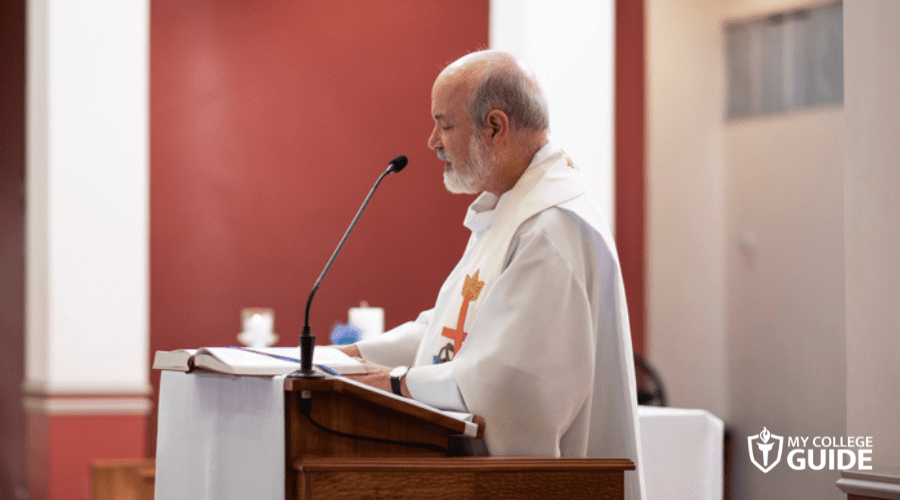
There are various programs that can help you achieve your goals. If you need the flexibility that comes with online classes, many colleges now offer online theology degrees that can be completed from the comfort of your own home. This can be an excellent option if you are juggling a career, volunteer, or family obligations in addition to your coursework.
Editorial Listing ShortCode:
If you have a passion for helping others and would like to be a part of your community’s path toward faith and religion, a degree in theology may be a great option.
What Can You Do With a Theology Degree?
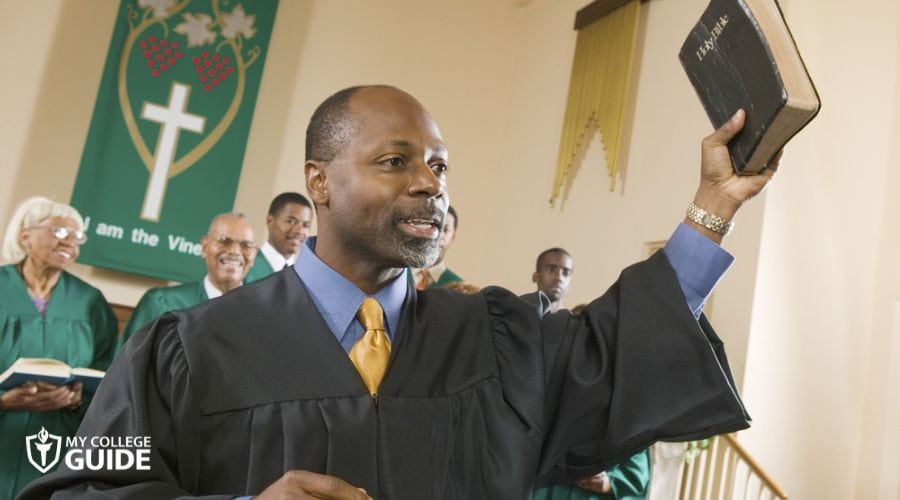
A theology degree can set you up for a lifetime of serving others and helping your peers and community. You can choose to be a religious leader, a minister, a priest, or a religious teacher. With a theology degree, you have the ability to enter the workforce in various sectors, including community service, leadership roles, and clergy.
Alternatively, those with a theology degree can go into counseling and help those who need a shoulder to lean on and guidance. According to the US Bureau of Labor Statistics, those with a theology degree can work as community and social service specialists can earn a median wage of $48,400. You could also choose to be a postsecondary philosophy or religion teacher, and potentially earn a median wage of $77,610.
Editorial Listing ShortCode:
There are a lot of opportunities to not only help others but better your community when you choose to earn a theology degree.
5 Things You Can Do with a Degree in Theology
The options for theology major careers expand beyond the traditional role of a pastor or leader of a congregation. A theology career matches your passion for religious doctrine with service to your community, much like social work careers.
Some popular jobs in theology include:
1. Religious Educator

Religious educators frequently work in private or parochial schools, or through non-profit outreach experiences. They may be tasked with teaching students of various ages religious theory and doctrine.
As part of this role, you would be expected to create and execute lesson plans, engage in meaningful discussion, and provide examinations to allow students to demonstrate knowledge of the topics covered in class.
2. Youth Pastor

A youth pastor serves as a mentor for children and young adults. As a connection between church and social life, youth pastors are responsible for engaging young people in religious knowledge and practice.
In this role, you may coordinate activities and outings that entertain and educate a youth congregation, as well as create lessons to help children cultivate a deeper knowledge of religion.
3. Parish Associate

A parish associate serves a mainly administrative role within the church. Their roles can be very broad and may include record-keeping, accounting, and scheduling tasks, as well as organizing fundraisers, coordinating volunteer efforts, or creating community outreach opportunities.
The role of a parish associate is very important to many congregations and often allows professionals to connect with the individuals in the parish as well as the community at large.
4. Music Ministry

Many churches choose to accentuate their worship services with choral and musical performances. As a professional in music ministry, you may be responsible for choosing musical pieces that coordinate with each sermon or special event. This may include leading the choir, planning rehearsals, and choosing appropriate music.
5. Archivist

The role of an archivist is to capture religious historical material. Archivists not only collect information but research the historical significance and work to preserve data for the future.
Editorial Listing ShortCode:
An archivist may be particular to a congregation or church family, but some theological archivists work in history or art museums to catalog, collect, and research religious documents, maps, and iconography.
Many careers in theology can provide professionals with the opportunity to connect more deeply with their religious experience while exploring their talents in other areas, as well.
Theology Careers & Salaries
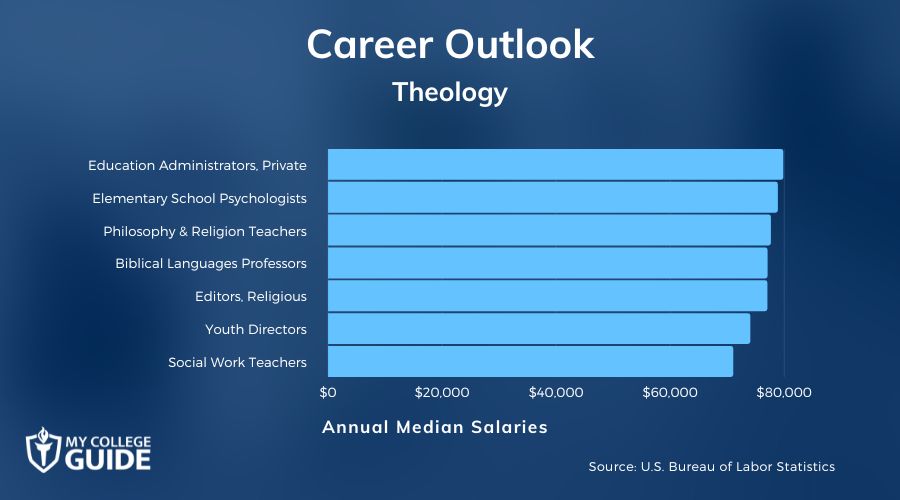
To help give you an idea of the many career ideas available to those who have graduated with a theology degree, we have put together a list top 40 theology careers and salaries and their respective median annual salaries.
The salaries and information listed below are based on information from the U.S. Bureau of Labor Statistics.
| Careers | Annual Median Salaries |
| Education Administrators, Private | $79,780 |
| Elementary School Psychologists | $78,830 |
| Philosophy and Religion Teachers, Postsecondary | $77,610 |
| Biblical Languages Professors | $77,030 |
| Editors, Religious | $77,000 |
| Youth Directors | $74,000 |
| Social Work Teachers, Postsecondary | $71,010 |
| Community Health Workers, Religious | $70,960 |
| Musicians, Church | $64,709 |
| Writers, Religious | $64,280 |
| Historians | $63,940 |
| Junior College Teachers | $63,590 |
| Lobbyists | $62,800 |
| Anthropologists | $61,910 |
| High School Teachers, Religion | $61,820 |
| Elementary School Teachers, Religion | $61,400 |
| Social Workers | $61,190 |
| Fundraisers | $60,660 |
| Archivists | $60,050 |
| Marriage/Family Therapists | $49,880 |
| Rabbis / Priests | $49,720 |
| Grief Counselors, Hospice/Home Care | $49,630 |
| School Counselors, Private | $49,430 |
| Mediators | $49,410 |
| Music Pastors | $49,130 |
| Funeral Directors | $48,950 |
| Music Directors, Religious | $48,420 |
| Journalists | $48,370 |
| Community Organization Workers | $47,390 |
| Directors, Religious Activities and Education | $46,980 |
| Social Service Specialists, Religious | $46,910 |
| Grief Counselors | $45,160 |
| Counselors, Hospital | $40,010 |
| Journalists, Periodicals and Books | $38,210 |
| Office Secretaries, Church | $37,880 |
| Addictions Counselor Assistants | $37,610 |
| Pastors | $37,500 |
| General Office Clerks | $37,030 |
| Preschool Teachers, Religion | $36,060 |
| Social and Human Service Assistants, Residential Care Facilities | $34,030 |
Religion and spirituality are the cornerstones of many people’s lives, and because of this, skilled spiritual leaders are always in high demand.
Editorial Listing ShortCode:
Whether you want to work with children and young adults in the educational setting or join the ministry of a church or other religious institution, there are many viable options for a fulfilling career. If you are interested in earning a doctorate in theology to teach within a university or college, postsecondary teachers are expected to have a 12% occupational growth over the next 10 years.
How to Know if Theological Studies is Right for Me

The study of theology allows students to dive deeper into their own philosophical and ethical understanding of religious doctrine. Beyond the many theology major careers, students will be challenged with:
- Questioning religious traditions and their modern-day application
- Analyzing religious doctrine
- Debating moral and ethical issues from the standpoint of religious teachings
- Learning about themselves in the context of faith
- Connecting with spiritual texts
- Reviewing and comparing religious doctrine
- Appreciating others’ points of view for the purpose of civil debate and exchange of knowledge
Unlike many collegiate programs, the study of theology is often a life-long process for many students and requires dedication to both education and spirituality.
What Is a Theology Degree?

Theology is a degree program that encompasses a broad spectrum of disciplines. Typically, courses within a theology degree program focus on religious studies, philosophy, world cultures, and interpretation and analysis of religious texts and principles.
This field of study provides students with an in-depth understanding of spiritual practices to prepare them for making a difference in their community through ministry work and education. Courses that you may take while working towards earning your degree in theology include:
- Biblical studies
- Research and academic writing
- Religious history
- Christian ethics
- Global Christianity
For those who are interested in theology but do not plan on going into a ministry-based career, it is common to use a theology degree as a bridge to other careers. For example, you may earn a degree in theology but also pursue your teaching license or counseling degree.
Editorial Listing ShortCode:
This would open up career paths that include teaching within private religious schools and universities or becoming a spiritual-based counselor to help clients and families through challenging times.
What Do You Learn in Theology?
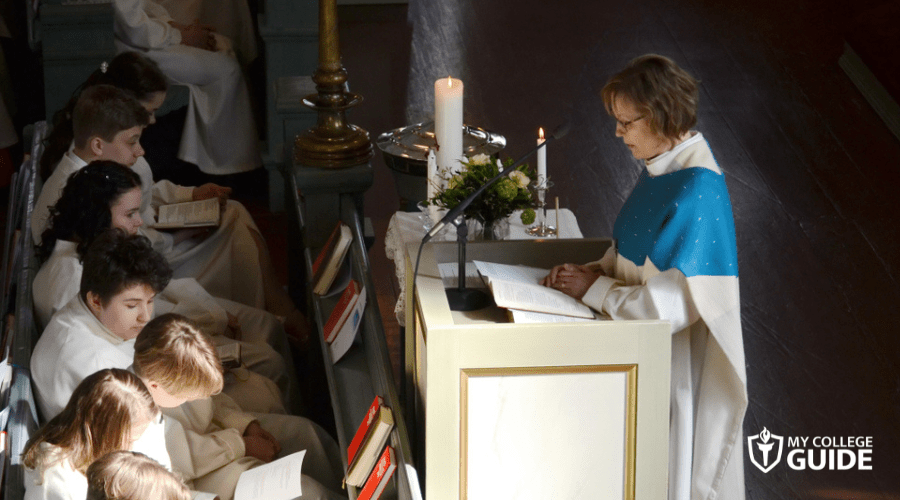
A theology degree doesn’t just help students understand and connect to their current religious beliefs, although that is one goal of many programs.
In addition to pursuing a greater understanding of religious beliefs, students of theology are often asked to study:
- Philosophical comparison of different religions
- Anthropological study of religious groups and traditions
- Ethical analysis of religious texts and teachings
Depending on the program you select, you may also have the opportunity to explore the impact shared between community and religious institutions, the cultural applications of religion, and how religion impacts various groups of individuals, as well.
What is a Theology Degree Good for?
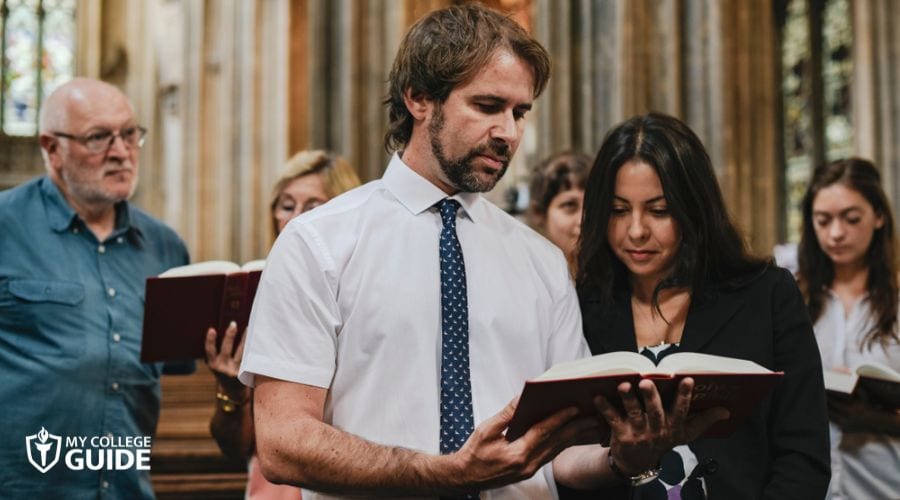
There are many opportunities you may choose to pursue when considering theology degree jobs, depending on your interests and talents.
Many theology majors pursue administrative roles ranging from church secretary to directors of religious activities and education within a parish or church community. Archivists’, curators’, and museum workers’ roles involve locating, preserving, and analyzing documents and objects pertaining to religious doctrine, which requires contextual appreciation.
Theology students may also wish to continue in education at all grade levels, either in a religious school or in youth ministry. Your analytical, anthropological, and historical knowledge as a theology student can be helpful in many careers.
What Other Jobs Can You Get With a Theology Degree?

Many theology students apply their knowledge and understanding of religious doctrine to careers that are outside of the secular field. For example, journalists and writers are not exclusively theology careers, but a theology major may choose to work for religious publications, or publish their own research and analysis.
Editorial Listing ShortCode:
Other graduates of theology programs apply their faith and compassion to fields that offer secular and non-secular roles, such as that of a social worker, substance abuse, behavioral disorder, and mental health counselor, or marriage and family therapists. Combining your skills, talents, passion, and faith can lead to many career opportunities.
How Much Money Can You Make with a Theology Degree?

The income potential for careers in theology depends on the type of job selected. According to the Bureau of Labor Statistics, archivists have a median annual salary of around $50,120. Kindergarten and elementary school teachers earn a bit more on average, with a median annual salary of $61,350.
Salaries for those who work directly in or for the church can vary greatly depending on the parish in which they are employed, with clergy across the country earning a median annual wage of $49,720. Other factors that may impact income are geographical location and level of experience.
Is Theology a Good Degree?
Yes, theology is a good degree for many students. While many careers allow professionals to engage their personal passions and talents, few do so as deeply as jobs in theology.
Not only do your studies in theology open up opportunities for you to grow personally, but they can provide you with marketable skills in both secular and non-secular roles in the professional world. While a passion for religious beliefs and ideals is often the starting point for theology professionals, sharing these concepts and connecting with others is often the cornerstone for a post-collegiate career.
Getting Your Theology Degree Online

Earning your theology degree online may be the start of growth in your own faith and spiritual life, as well as on your career path.
If you wish to dive deeper into understanding and analyzing the meaning of religion from a philosophical and anthropological point of view, getting your theology degree may be a great step towards a profession that is meaningful to you.
Take a look at the programs offered, as well as your own interests in talents to determine if a theology degree is right for you, and get ready to immerse yourself in the world of theology!
